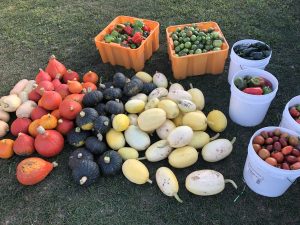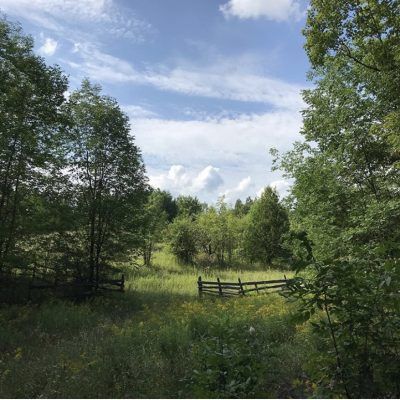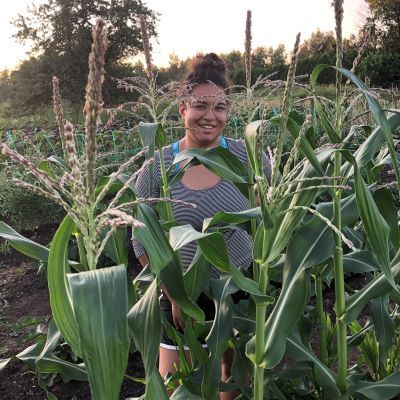by Celeste Lopreiato
I’ve been involved with farming for about four years. After an inspiring summer working on my university campus’s organic farm – I caught the bug. Over the past few years I’ve met and talked to hundreds of local ecological vegetable farmers.
We’ve talked about many things, from marketing to pests and diseases, burnout, and labour, but one topic that doesn’t seem to come up much is how these farmers bought their land. Usually it’s by leveraging privilege . . . and it definitely was for me.

I realized I wanted to own/ live on some sort of farm after growing up in Toronto and loving city life less and less as I grew older. About a year ago, my partner and I decided we were going to start this journey. At the time, I was running a growing farm-to-table meal delivery business out of Guelph, and farming a quarter-acre with almost no infrastructure (the joys of rented land!). I also knew that my business was outgrowing my space, and that I would soon have to find a much more expensive rental, and I also wanted to expand the farming side of my business. We recognized that it would be a much better investment to build a commercial space on our own property, and we had a sizable off-farm household income to help fund this. We decided to move our dream of purchasing land to the forefront and start looking seriously, but we didn’t know what kind of sacrifices we would need to make.
We quickly realized we were priced out of Wellington County, and were likely going to be priced out of our second option (Grey County) in the next year. So we acted fast. We decided in less than a week that we were going to have to move 1.5 hours away from our community, friends and family, if we ever wanted our dream to become reality. We are a young, Queer, mixed race couple – probably the only one in the rural area we were now thinking of calling home.
Even though we made a household income of $90K, we only qualified for a mortgage of around $300K because my self-employed income didn’t count (I’d been in business for less than three years). We met with a mortgage broker and found a way to get qualified for a mortgage of up to $650K, if my mom was willing to co-sign. We initially set out with a budget of $500K and wanted at least 20 acres, a compromise for having to move so far. It had to have a house, because vacant land requires a 50 per cent down payment, and most first time buyers won’t even get a mortgage for it. We looked for about a month, and nothing with more than one acre was available for under $550K in the entirety of Grey County. In fact, anything with close to 20 acres was at least $900k. Then we were hit with the realization that with any agricultural purchase, you need a 20% down payment. That was $110k. We needed to somehow find more money, and were most certainly going to need help from our parents. We laid this all out to my parents-in-law, who were kind enough to give us a big chunk of that money (HUGE privilege), and we sold anything of value we had to make up the rest.
 We ended up finding a mostly wooded property, with a half-acre of pasture. There was no farm infrastructure other than a barn, and we probably have more rocks than soil. Not only is our farm not “ideal” for farming, but we immediately realized we’d never be able to afford it through farming alone, and we honestly couldn’t even if we tried. My partner’s good-paying job is what got us a mortgage (and the ability to pay it!). Also, our mortgage payment, utilities, insurance, and property tax add upt to about $3000 a month – which would be nearly impossible to support on a small farm’s revenue. Most small-scale vegetable farmers I know aren’t even profiting $3000 a month, so how would they be able to pay the property costs, let alone other personal expenses?
We ended up finding a mostly wooded property, with a half-acre of pasture. There was no farm infrastructure other than a barn, and we probably have more rocks than soil. Not only is our farm not “ideal” for farming, but we immediately realized we’d never be able to afford it through farming alone, and we honestly couldn’t even if we tried. My partner’s good-paying job is what got us a mortgage (and the ability to pay it!). Also, our mortgage payment, utilities, insurance, and property tax add upt to about $3000 a month – which would be nearly impossible to support on a small farm’s revenue. Most small-scale vegetable farmers I know aren’t even profiting $3000 a month, so how would they be able to pay the property costs, let alone other personal expenses?
The crazy thing is that our farm sold for $350K just six years ago. In six years, the price doubled. In the next town over, we have farming friends who bought 100-acre farms with houses & barns for under $350K, just 10 years ago. Nowadays I see listings for 100-acre pieces of vacant land for over $1 million.
I didn’t know how others were doing it, but then it all started to make sense. Now when I see young southern Ontario farmers posting about buying land, I know that they likely did not get a mortgage from their farm income alone, probably got help from their parents, and probably have someone working off farm. Most of them just so happened to buy their farms before the market shot up. If you’re a farmer that encourages others to get into the industry, think about sharing these realities with aspiring farmers, because sugar coating the farming life isn’t helpful. We need to tell young people that it’s not going to be possible for them to buy land through farming alone. That working as an unpaid intern might push them even further away from a future in farming. And if you don’t want to tell them this, we need to start doing something about it.
As I look at our rural community I see more and more “vacation homes” on 50 acres of pasture, 6000 sq ft mansions being built on semi-affordable lots driving up the land cost by 200 per cent, and non-farming inheritors of land holding on to empty properties, waiting to sell to developers in 5-10 years. I see such a dire situation, perhaps the most pressing farming issue, and not many farmers discussing it. I want this to change. And I want more farmers to think about how their race, generational wealth, and the previous stabilized housing market impacted their land acquisition. Working hard growing lettuce isn’t what bought your farm.
—
If you are interested in learning more about our journey, you can follow us on Instagram: @slowgrowingfarm. Our aim is to provide representation for Queer & BIPOC farmers, and help new and aspiring farmers create and grow value-add farm businesses that financially empower them to build the life they want for themselves.

